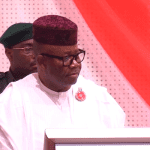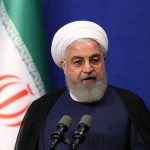U.S. President Donald Trump warned China on Saturday that it should face consequences if it was “knowingly responsible” for the coronavirus pandemic, as he ratcheted up criticism of Beijing over its handling of the outbreak.
“It could have been stopped in China before it started and it wasn’t, and the whole world is suffering because of it,” Trump told a daily White House briefing.
It was the latest U.S. volley in a war of words between the world’s two biggest economies, showing increased strains in relations at a time when experts say an unprecedented level of cooperation is needed to deal with the coronavirus crisis.
“If it was a mistake, a mistake is a mistake. But if they were knowingly responsible, yeah, I mean, then sure there should be consequences,” Trump said. He did not elaborate on what actions the United States might take.
Trump and senior aides have accused China of a lack of transparency after the coronavirus broke out late last year in its city of Wuhan. This week he suspended aid to the World Health Organization accusing it of being “China-centric.”
Washington and Beijing have repeatedly sparred in public over the virus. Trump initially lavished praise on China and his counterpart Xi Jinping for their response. But he and other senior officials have also referred to it as the “Chinese virus” and in recent days have ramped up their rhetoric.
They have also angrily rejected earlier attempts by some Chinese officials to blame the origin of the virus on the U.S. military.
Trump’s domestic critics say that while China performed badly at the outset and must still come clean on what happened, he is now seeking to use Beijing to help deflect from the shortcomings of his own response and take advantage of growing anti-China sentiment among some voters for his 2020 re-election bid.
At the same time, however, White House officials are mindful of the potential backlash if tensions get too heated. The United States is heavily reliant on China for personal protection equipment desperately needed by American medical workers, and Trump also wants to keep a hard-won trade deal on track.
Trump said that until recently the U.S.-China relationship had been good, citing a multi-billion agricultural agreement aimed at defusing a bitter trade war. “But then all of a sudden you hear about this,” he said.
He said the Chinese were “embarrassed” and the question now was whether what happened with the coronavirus was “a mistake that got out of control, or was it done deliberately?”
“There’s a big difference between those two,” he said.
U.S. President Donald Trump warned China on Saturday that it should face consequences if it was “knowingly responsible” for the coronavirus pandemic, as he ratcheted up criticism of Beijing over its handling of the outbreak.
“It could have been stopped in China before it started and it wasn’t, and the whole world is suffering because of it,” Trump told a daily White House briefing.
It was the latest U.S. volley in a war of words between the world’s two biggest economies, showing increased strains in relations at a time when experts say an unprecedented level of cooperation is needed to deal with the coronavirus crisis.
“If it was a mistake, a mistake is a mistake. But if they were knowingly responsible, yeah, I mean, then sure there should be consequences,” Trump said. He did not elaborate on what actions the United States might take.
Trump and senior aides have accused China of a lack of transparency after the coronavirus broke out late last year in its city of Wuhan. This week he suspended aid to the World Health Organization accusing it of being “China-centric.”
Washington and Beijing have repeatedly sparred in public over the virus. Trump initially lavished praise on China and his counterpart Xi Jinping for their response. But he and other senior officials have also referred to it as the “Chinese virus” and in recent days have ramped up their rhetoric.
They have also angrily rejected earlier attempts by some Chinese officials to blame the origin of the virus on the U.S. military.
Trump’s domestic critics say that while China performed badly at the outset and must still come clean on what happened, he is now seeking to use Beijing to help deflect from the shortcomings of his own response and take advantage of growing anti-China sentiment among some voters for his 2020 re-election bid.
At the same time, however, White House officials are mindful of the potential backlash if tensions get too heated. The United States is heavily reliant on China for personal protection equipment desperately needed by American medical workers, and Trump also wants to keep a hard-won trade deal on track.
Trump said that until recently the U.S.-China relationship had been good, citing a multi-billion agricultural agreement aimed at defusing a bitter trade war. “But then all of a sudden you hear about this,” he said.
He said the Chinese were “embarrassed” and the question now was whether what happened with the coronavirus was “a mistake that got out of control, or was it done deliberately?”
“There’s a big difference between those two,” he said.
U.S. President Donald Trump warned China on Saturday that it should face consequences if it was “knowingly responsible” for the coronavirus pandemic, as he ratcheted up criticism of Beijing over its handling of the outbreak.
“It could have been stopped in China before it started and it wasn’t, and the whole world is suffering because of it,” Trump told a daily White House briefing.
It was the latest U.S. volley in a war of words between the world’s two biggest economies, showing increased strains in relations at a time when experts say an unprecedented level of cooperation is needed to deal with the coronavirus crisis.
“If it was a mistake, a mistake is a mistake. But if they were knowingly responsible, yeah, I mean, then sure there should be consequences,” Trump said. He did not elaborate on what actions the United States might take.
Trump and senior aides have accused China of a lack of transparency after the coronavirus broke out late last year in its city of Wuhan. This week he suspended aid to the World Health Organization accusing it of being “China-centric.”
Washington and Beijing have repeatedly sparred in public over the virus. Trump initially lavished praise on China and his counterpart Xi Jinping for their response. But he and other senior officials have also referred to it as the “Chinese virus” and in recent days have ramped up their rhetoric.
They have also angrily rejected earlier attempts by some Chinese officials to blame the origin of the virus on the U.S. military.
Trump’s domestic critics say that while China performed badly at the outset and must still come clean on what happened, he is now seeking to use Beijing to help deflect from the shortcomings of his own response and take advantage of growing anti-China sentiment among some voters for his 2020 re-election bid.
At the same time, however, White House officials are mindful of the potential backlash if tensions get too heated. The United States is heavily reliant on China for personal protection equipment desperately needed by American medical workers, and Trump also wants to keep a hard-won trade deal on track.
Trump said that until recently the U.S.-China relationship had been good, citing a multi-billion agricultural agreement aimed at defusing a bitter trade war. “But then all of a sudden you hear about this,” he said.
He said the Chinese were “embarrassed” and the question now was whether what happened with the coronavirus was “a mistake that got out of control, or was it done deliberately?”
“There’s a big difference between those two,” he said.
U.S. President Donald Trump warned China on Saturday that it should face consequences if it was “knowingly responsible” for the coronavirus pandemic, as he ratcheted up criticism of Beijing over its handling of the outbreak.
“It could have been stopped in China before it started and it wasn’t, and the whole world is suffering because of it,” Trump told a daily White House briefing.
It was the latest U.S. volley in a war of words between the world’s two biggest economies, showing increased strains in relations at a time when experts say an unprecedented level of cooperation is needed to deal with the coronavirus crisis.
“If it was a mistake, a mistake is a mistake. But if they were knowingly responsible, yeah, I mean, then sure there should be consequences,” Trump said. He did not elaborate on what actions the United States might take.
Trump and senior aides have accused China of a lack of transparency after the coronavirus broke out late last year in its city of Wuhan. This week he suspended aid to the World Health Organization accusing it of being “China-centric.”
Washington and Beijing have repeatedly sparred in public over the virus. Trump initially lavished praise on China and his counterpart Xi Jinping for their response. But he and other senior officials have also referred to it as the “Chinese virus” and in recent days have ramped up their rhetoric.
They have also angrily rejected earlier attempts by some Chinese officials to blame the origin of the virus on the U.S. military.
Trump’s domestic critics say that while China performed badly at the outset and must still come clean on what happened, he is now seeking to use Beijing to help deflect from the shortcomings of his own response and take advantage of growing anti-China sentiment among some voters for his 2020 re-election bid.
At the same time, however, White House officials are mindful of the potential backlash if tensions get too heated. The United States is heavily reliant on China for personal protection equipment desperately needed by American medical workers, and Trump also wants to keep a hard-won trade deal on track.
Trump said that until recently the U.S.-China relationship had been good, citing a multi-billion agricultural agreement aimed at defusing a bitter trade war. “But then all of a sudden you hear about this,” he said.
He said the Chinese were “embarrassed” and the question now was whether what happened with the coronavirus was “a mistake that got out of control, or was it done deliberately?”
“There’s a big difference between those two,” he said.
U.S. President Donald Trump warned China on Saturday that it should face consequences if it was “knowingly responsible” for the coronavirus pandemic, as he ratcheted up criticism of Beijing over its handling of the outbreak.
“It could have been stopped in China before it started and it wasn’t, and the whole world is suffering because of it,” Trump told a daily White House briefing.
It was the latest U.S. volley in a war of words between the world’s two biggest economies, showing increased strains in relations at a time when experts say an unprecedented level of cooperation is needed to deal with the coronavirus crisis.
“If it was a mistake, a mistake is a mistake. But if they were knowingly responsible, yeah, I mean, then sure there should be consequences,” Trump said. He did not elaborate on what actions the United States might take.
Trump and senior aides have accused China of a lack of transparency after the coronavirus broke out late last year in its city of Wuhan. This week he suspended aid to the World Health Organization accusing it of being “China-centric.”
Washington and Beijing have repeatedly sparred in public over the virus. Trump initially lavished praise on China and his counterpart Xi Jinping for their response. But he and other senior officials have also referred to it as the “Chinese virus” and in recent days have ramped up their rhetoric.
They have also angrily rejected earlier attempts by some Chinese officials to blame the origin of the virus on the U.S. military.
Trump’s domestic critics say that while China performed badly at the outset and must still come clean on what happened, he is now seeking to use Beijing to help deflect from the shortcomings of his own response and take advantage of growing anti-China sentiment among some voters for his 2020 re-election bid.
At the same time, however, White House officials are mindful of the potential backlash if tensions get too heated. The United States is heavily reliant on China for personal protection equipment desperately needed by American medical workers, and Trump also wants to keep a hard-won trade deal on track.
Trump said that until recently the U.S.-China relationship had been good, citing a multi-billion agricultural agreement aimed at defusing a bitter trade war. “But then all of a sudden you hear about this,” he said.
He said the Chinese were “embarrassed” and the question now was whether what happened with the coronavirus was “a mistake that got out of control, or was it done deliberately?”
“There’s a big difference between those two,” he said.
U.S. President Donald Trump warned China on Saturday that it should face consequences if it was “knowingly responsible” for the coronavirus pandemic, as he ratcheted up criticism of Beijing over its handling of the outbreak.
“It could have been stopped in China before it started and it wasn’t, and the whole world is suffering because of it,” Trump told a daily White House briefing.
It was the latest U.S. volley in a war of words between the world’s two biggest economies, showing increased strains in relations at a time when experts say an unprecedented level of cooperation is needed to deal with the coronavirus crisis.
“If it was a mistake, a mistake is a mistake. But if they were knowingly responsible, yeah, I mean, then sure there should be consequences,” Trump said. He did not elaborate on what actions the United States might take.
Trump and senior aides have accused China of a lack of transparency after the coronavirus broke out late last year in its city of Wuhan. This week he suspended aid to the World Health Organization accusing it of being “China-centric.”
Washington and Beijing have repeatedly sparred in public over the virus. Trump initially lavished praise on China and his counterpart Xi Jinping for their response. But he and other senior officials have also referred to it as the “Chinese virus” and in recent days have ramped up their rhetoric.
They have also angrily rejected earlier attempts by some Chinese officials to blame the origin of the virus on the U.S. military.
Trump’s domestic critics say that while China performed badly at the outset and must still come clean on what happened, he is now seeking to use Beijing to help deflect from the shortcomings of his own response and take advantage of growing anti-China sentiment among some voters for his 2020 re-election bid.
At the same time, however, White House officials are mindful of the potential backlash if tensions get too heated. The United States is heavily reliant on China for personal protection equipment desperately needed by American medical workers, and Trump also wants to keep a hard-won trade deal on track.
Trump said that until recently the U.S.-China relationship had been good, citing a multi-billion agricultural agreement aimed at defusing a bitter trade war. “But then all of a sudden you hear about this,” he said.
He said the Chinese were “embarrassed” and the question now was whether what happened with the coronavirus was “a mistake that got out of control, or was it done deliberately?”
“There’s a big difference between those two,” he said.
U.S. President Donald Trump warned China on Saturday that it should face consequences if it was “knowingly responsible” for the coronavirus pandemic, as he ratcheted up criticism of Beijing over its handling of the outbreak.
“It could have been stopped in China before it started and it wasn’t, and the whole world is suffering because of it,” Trump told a daily White House briefing.
It was the latest U.S. volley in a war of words between the world’s two biggest economies, showing increased strains in relations at a time when experts say an unprecedented level of cooperation is needed to deal with the coronavirus crisis.
“If it was a mistake, a mistake is a mistake. But if they were knowingly responsible, yeah, I mean, then sure there should be consequences,” Trump said. He did not elaborate on what actions the United States might take.
Trump and senior aides have accused China of a lack of transparency after the coronavirus broke out late last year in its city of Wuhan. This week he suspended aid to the World Health Organization accusing it of being “China-centric.”
Washington and Beijing have repeatedly sparred in public over the virus. Trump initially lavished praise on China and his counterpart Xi Jinping for their response. But he and other senior officials have also referred to it as the “Chinese virus” and in recent days have ramped up their rhetoric.
They have also angrily rejected earlier attempts by some Chinese officials to blame the origin of the virus on the U.S. military.
Trump’s domestic critics say that while China performed badly at the outset and must still come clean on what happened, he is now seeking to use Beijing to help deflect from the shortcomings of his own response and take advantage of growing anti-China sentiment among some voters for his 2020 re-election bid.
At the same time, however, White House officials are mindful of the potential backlash if tensions get too heated. The United States is heavily reliant on China for personal protection equipment desperately needed by American medical workers, and Trump also wants to keep a hard-won trade deal on track.
Trump said that until recently the U.S.-China relationship had been good, citing a multi-billion agricultural agreement aimed at defusing a bitter trade war. “But then all of a sudden you hear about this,” he said.
He said the Chinese were “embarrassed” and the question now was whether what happened with the coronavirus was “a mistake that got out of control, or was it done deliberately?”
“There’s a big difference between those two,” he said.
U.S. President Donald Trump warned China on Saturday that it should face consequences if it was “knowingly responsible” for the coronavirus pandemic, as he ratcheted up criticism of Beijing over its handling of the outbreak.
“It could have been stopped in China before it started and it wasn’t, and the whole world is suffering because of it,” Trump told a daily White House briefing.
It was the latest U.S. volley in a war of words between the world’s two biggest economies, showing increased strains in relations at a time when experts say an unprecedented level of cooperation is needed to deal with the coronavirus crisis.
“If it was a mistake, a mistake is a mistake. But if they were knowingly responsible, yeah, I mean, then sure there should be consequences,” Trump said. He did not elaborate on what actions the United States might take.
Trump and senior aides have accused China of a lack of transparency after the coronavirus broke out late last year in its city of Wuhan. This week he suspended aid to the World Health Organization accusing it of being “China-centric.”
Washington and Beijing have repeatedly sparred in public over the virus. Trump initially lavished praise on China and his counterpart Xi Jinping for their response. But he and other senior officials have also referred to it as the “Chinese virus” and in recent days have ramped up their rhetoric.
They have also angrily rejected earlier attempts by some Chinese officials to blame the origin of the virus on the U.S. military.
Trump’s domestic critics say that while China performed badly at the outset and must still come clean on what happened, he is now seeking to use Beijing to help deflect from the shortcomings of his own response and take advantage of growing anti-China sentiment among some voters for his 2020 re-election bid.
At the same time, however, White House officials are mindful of the potential backlash if tensions get too heated. The United States is heavily reliant on China for personal protection equipment desperately needed by American medical workers, and Trump also wants to keep a hard-won trade deal on track.
Trump said that until recently the U.S.-China relationship had been good, citing a multi-billion agricultural agreement aimed at defusing a bitter trade war. “But then all of a sudden you hear about this,” he said.
He said the Chinese were “embarrassed” and the question now was whether what happened with the coronavirus was “a mistake that got out of control, or was it done deliberately?”
“There’s a big difference between those two,” he said.














